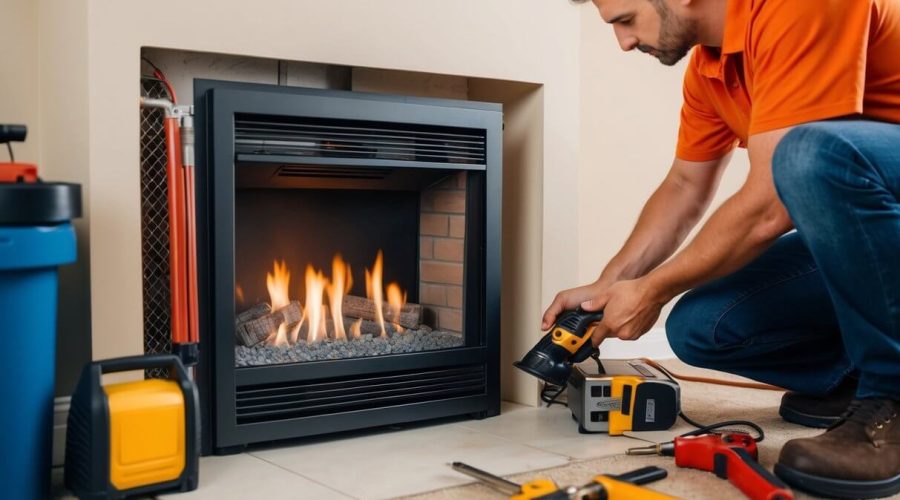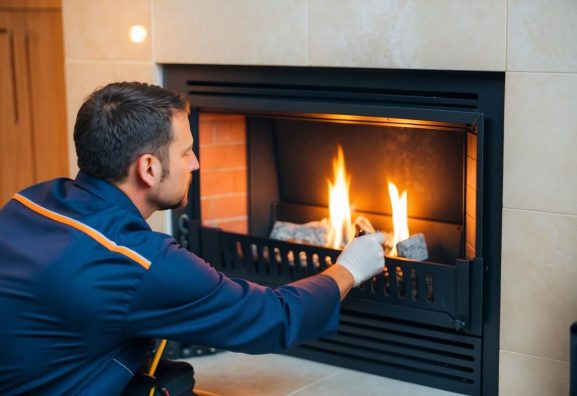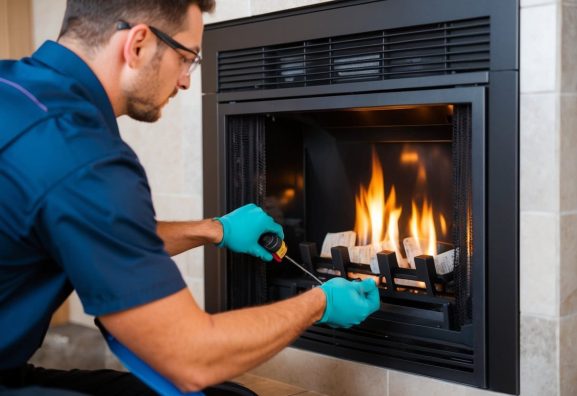Who Fixes Gas Fireplaces? Expert Repair Services
Gas fireplaces are a popular choice for warmth and ambiance in homes, but they require proper maintenance and repair to function safely and efficiently. Homeowners with gas fireplaces should know that qualified professionals, such as plumbers and specialized gas line technicians, are the ones who can effectively handle repairs and ensure safety compliance. From routine maintenance to troubleshooting common problems, these experts understand the intricacies of gas fireplace systems.
Knowing when to call a professional can save both time and money. Identifying issues early, such as a burning smell or inconsistent heating, is crucial for preventing more significant problems down the line. By relying on skilled technicians, homeowners can enjoy a reliable source of heat while minimizing the risk of gas leaks and inefficiencies.
Whether it’s a simple repair or a more involved installation, finding the right expert is essential. This article will explore who fixes gas fireplaces and what services they provide, ensuring readers have the knowledge to keep their gas fireplaces in top shape.
Key Takeaways
- Professionals are essential for troubleshooting and repairing gas fireplace issues.
- Routine maintenance can prevent common problems and enhance safety.
- Understanding gas fireplace systems aids in making informed decisions regarding repairs and services.
Understanding Gas Fireplace Systems
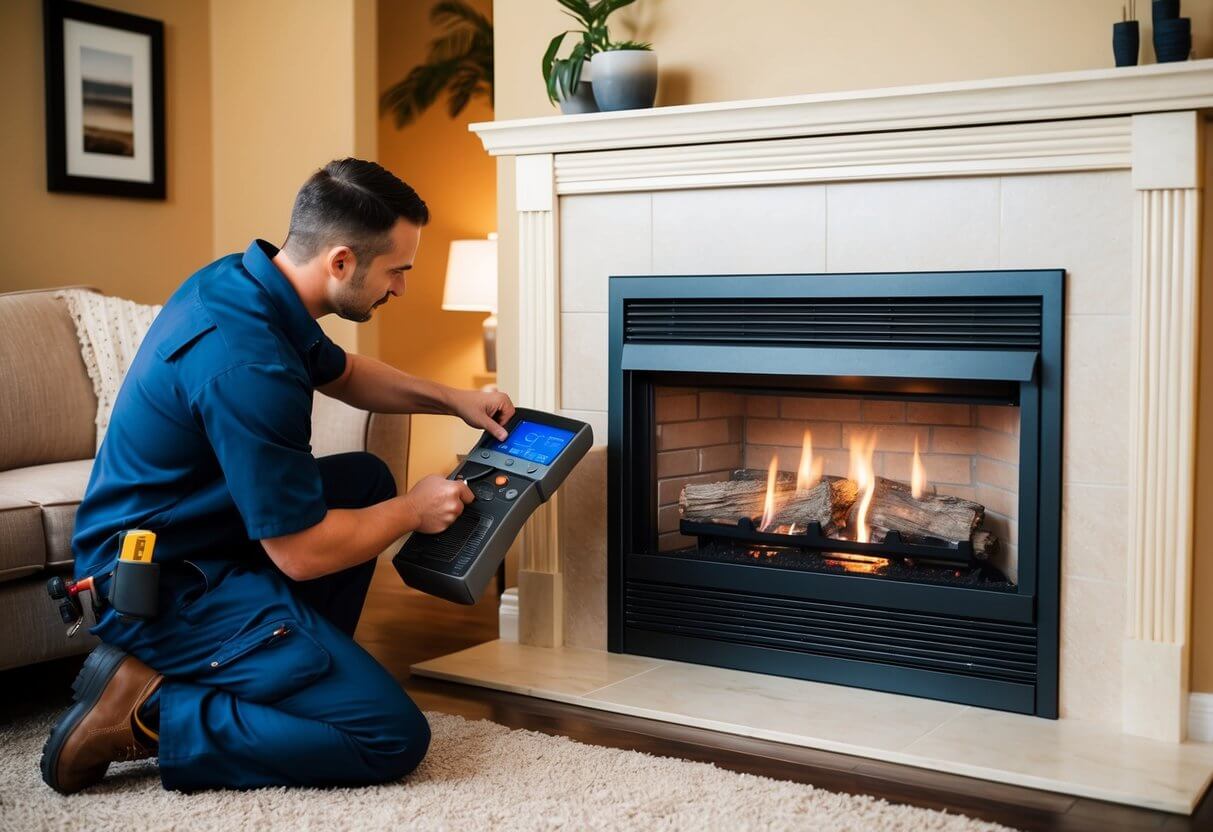
Gas fireplaces comprise specific components and features that differentiate them from wood-burning options. Understanding these elements ensures proper maintenance and effective troubleshooting.
Components of a Gas Fireplace
A gas fireplace includes several key components that work in unison. The gas valve controls the flow of gas to the burner. This valve must be in good condition for safe operation. The thermocouple is a safety device that ensures gas flow stops if the pilot light goes out.
The spark igniter lights the gas when the fireplace is turned on, ensuring a quick start. Various log sets made from ceramic or other materials provide an aesthetic appeal and help distribute heat efficiently. Regular maintenance of these components is essential for optimal performance and longevity.
Gas Fireplace vs. Wood Fireplace
Gas fireplaces offer distinct advantages compared to wood fireplaces. They provide instant ignition through a spark igniter and require less maintenance since they do not produce ash or require wood storage. This convenience makes them appealing for homeowners seeking ease of use.
Conversely, wood fireplaces create a traditional ambiance with the crackling sound and scent of burning wood. They can be more labor-intensive, requiring regular cleaning of chimneys and flues to prevent creosote buildup. Understanding these differences allows homeowners to choose the optimal fireplace for their needs.
Routine Maintenance and Servicing
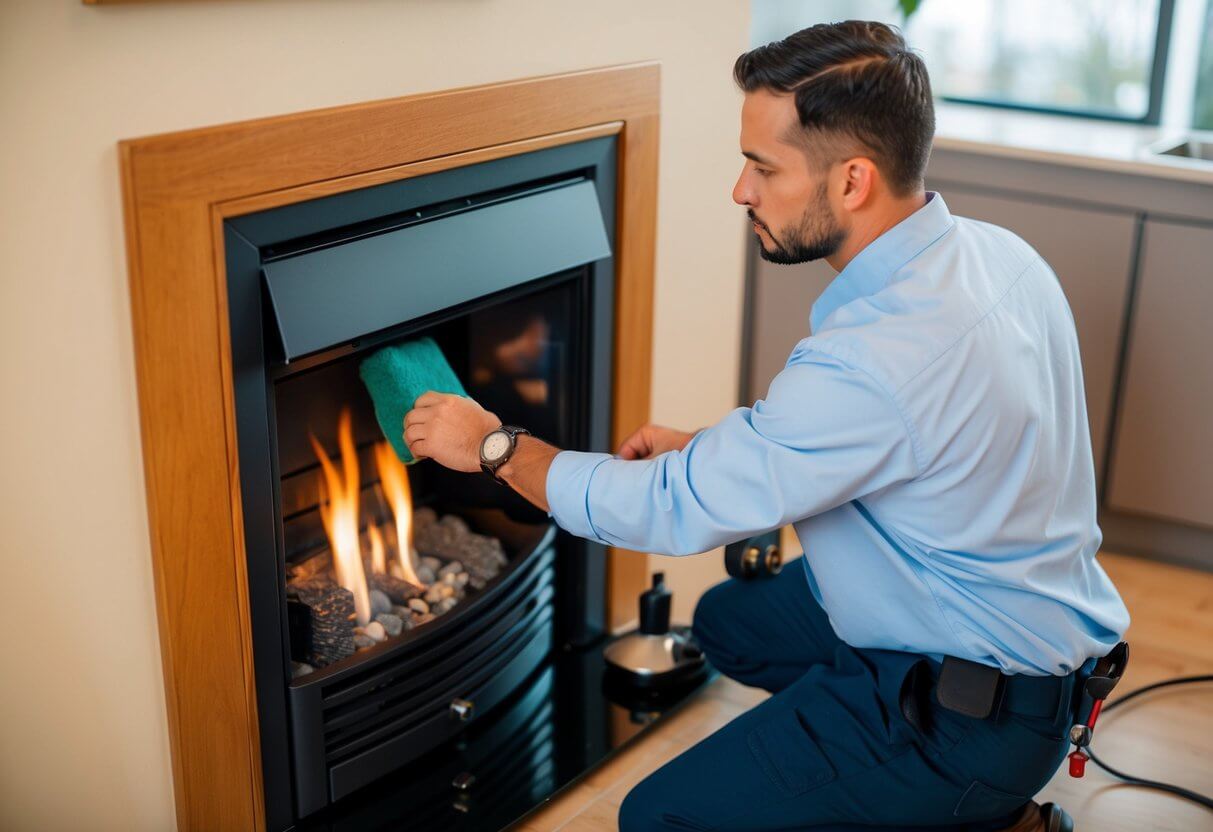
Regular maintenance is essential for ensuring the safe and efficient operation of a gas fireplace. This involves both cleaning and inspection by the homeowner, as well as professional servicing to address any technical issues.
Cleaning and Inspection
Routine cleaning helps maintain the integrity of the gas fireplace. Homeowners should regularly check and clean the glass panel to prevent soot buildup, ensuring clarity and aesthetic appeal. Inspecting the logs and burner is also crucial; any debris or soot can impede proper functioning.
Additionally, it is important to verify that the pilot light is burning steadily and is not blocked. Homeowners should also examine the ventilation system for any signs of obstruction. Furthermore, ensure that a carbon monoxide detector is installed nearby and functioning correctly. This device is critical for safety, detecting any harmful gas leaks.
Professional Gas Fireplace Service
Hiring a qualified technician for annual service is vital for safety and efficiency. A professional gas fireplace service will conduct thorough inspections of all gas connections, ensuring there are no leaks. They also check the burner performance and can adjust the flame and pilot light as necessary.
During the yearly service, technicians can clean components that homeowners may not access easily. This includes checking internal mechanisms and ensuring all parts operate correctly. By engaging a qualified professional, homeowners can extend the lifespan of their fireplace and enhance its efficiency.
Troubleshooting Common Issues
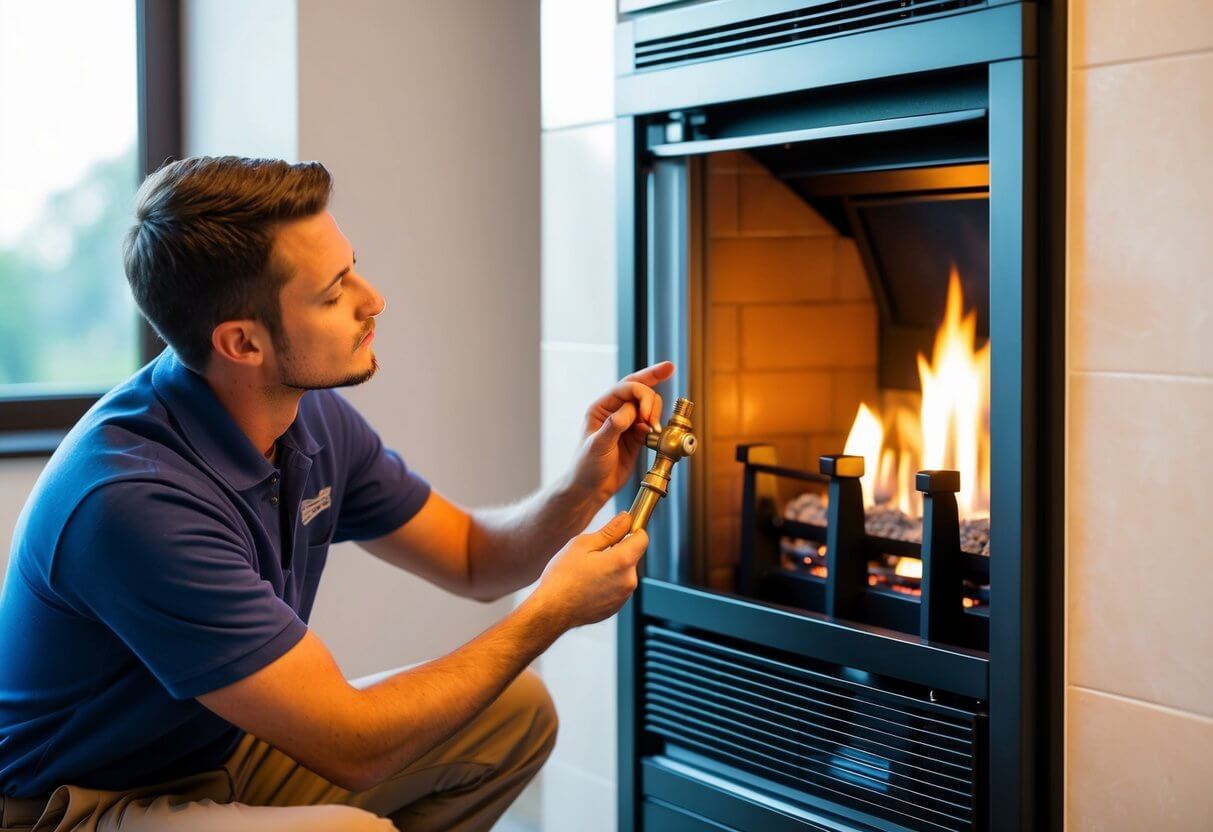
When dealing with a gas fireplace, users may encounter various problems. Addressing these issues early can prevent further complications and ensure safety in the home. Key aspects to consider include pilot light functionality and safety regarding gas leaks.
Pilot Light Problems
A common issue in gas fireplaces is the pilot light not staying lit. This situation can arise from a dirty pilot light tube or a malfunctioning thermocouple. The thermocouple is a safety device that detects heat from the flame. If it is faulty, it may not signal the main gas valve to stay open.
To troubleshoot, users should first clean the pilot light tube. A simple cleaning with a soft brush can often resolve debris build-up. If cleaning does not help, they may need to replace the thermocouple. If the pilot light continuously goes out, it’s advisable to consult a professional for further diagnosis.
Gas Leaks and Safety
Gas leaks are a serious concern that can lead to hazardous situations. Users often notice a rotten egg odor, which is a clear indication of a gas leak. If this smell is detected, it is crucial to turn off the gas immediately and avoid using any ignition sources.
Regular inspection of gas lines is essential for safety. Installing a carbon monoxide detector in proximity to the fireplace can provide an extra layer of protection. If a leak is suspected, professionals trained in gas fireplace repair should be contacted for thorough inspection and repair. Maintaining safety is paramount when facing potential gas leaks.
Installation and Upgrades
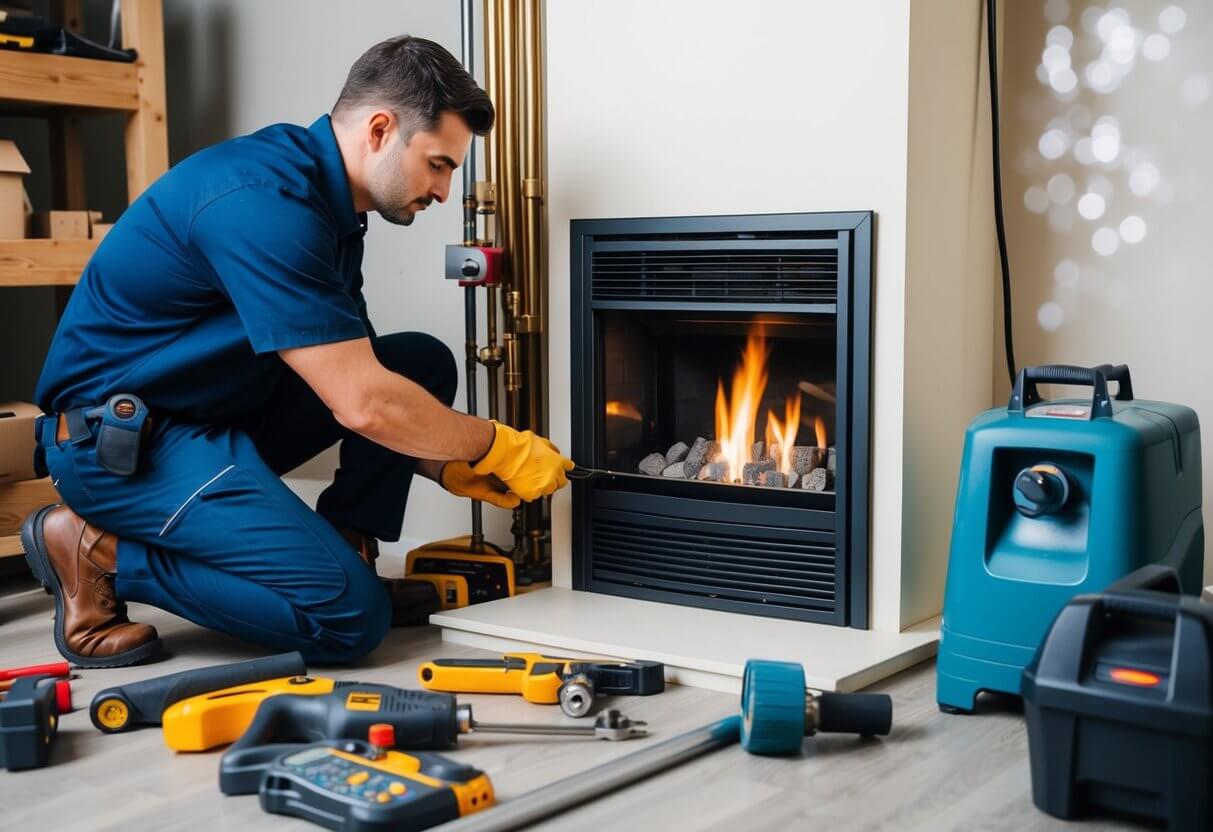
Installing or upgrading a gas fireplace involves significant considerations, including costs and specific features. Understanding these aspects can help homeowners make informed choices and enhance their living spaces.
Cost Considerations for New Installations
The cost to install a gas fireplace can vary widely based on several factors. Installation for vented gas fireplaces typically ranges from $2,200 to $7,500. Ventless options are generally more economical, falling between $1,800 and $3,000.
Key expenses include:
- Labor costs: Professional installation is essential for safety and efficiency. Labor fees often account for a significant portion of the total cost.
- Materials: This includes the fireplace unit itself and any necessary venting or gas line installations. Log sets and decorative elements can add to the overall expense.
- Wiring installation: If electric features are included, such as ignitions or blowers, additional wiring may be necessary, increasing costs further.
Considering potential maintenance costs over time is important for budgeting.
Upgrading Your Gas Fireplace
Upgrading a gas fireplace can enhance aesthetics and efficiency. Homeowners should consider the condition of existing components before making decisions.
Upgrades may include:
- Gas fireplace inserts: These can improve efficiency and modernize performance while fitting into existing structures.
- Structural changes: Modifications to the fireplace or surrounding area may be required for ventilation and aesthetics.
- New log sets: These can refresh the appearance and enhance the ambiance of the fireplace.
- Thermal upgrades: Adding improved insulation or redoing the outer casing may boost heat retention.
Hiring professionals familiar with gas fireplace maintenance ensures that upgrades are done correctly and safely, potentially increasing the property’s value.
Hiring Professionals
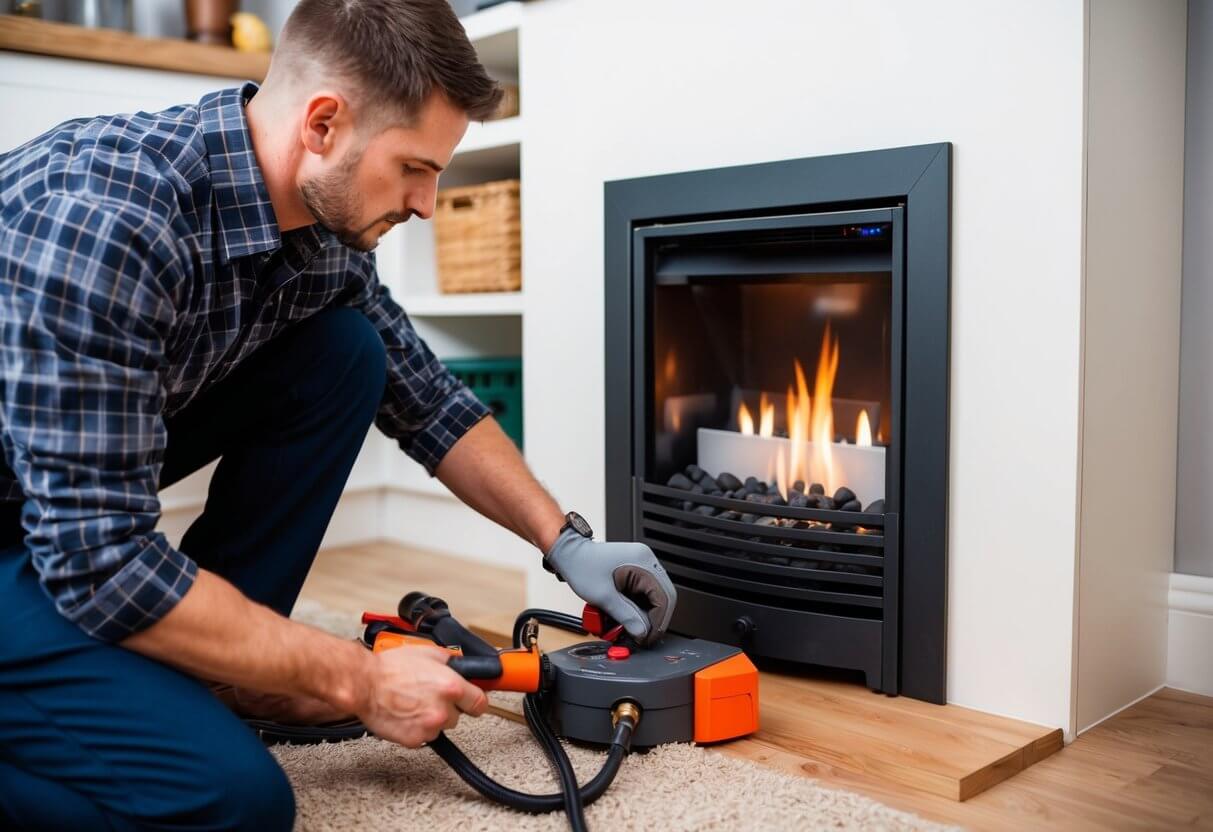
Ensuring the safety and efficiency of your gas fireplace is critical, and hiring the right professional makes all the difference. At gasfireplacecleaning.com, we are a trusted company serving multiple locations, providing skilled technicians who specialize in gas fireplace repair and maintenance. By choosing our services, you are guaranteed expert care from professionals who meet the highest standards of safety and service.
Why Choose Our Company?
Finding the right technician can be time-consuming and risky, especially when dealing with gas-related systems. We make it simple by offering qualified, certified professionals across various locations, so you can have peace of mind knowing your fireplace is in safe hands.
● Experienced Professionals: Our technicians are vetted for their expertise, certifications, and experience in gas fireplace repair, ensuring the highest quality of service.
● Local Availability: With teams available in multiple areas, we offer prompt, reliable service wherever you’re located, making it convenient for you to maintain your gas fireplace.
● Clear Pricing: We provide upfront quotes with no hidden fees, allowing you to budget confidently for repairs and maintenance. Certified and Safe
Working with gas systems requires expertise and safety measures. All of our technicians hold certifications such as the National Fireplace Institute (NFI) or adhere to National Fire Protection Association (NFPA) standards, ensuring they are equipped to handle any gas fireplace repair or maintenance task safely. Convenience and Reliability Instead of wasting time searching for individual contractors, rely on gasfireplacecleaning.com to deliver professional, high-quality service in your area. Whether it’s routine maintenance, troubleshooting, or complex repairs, our experts are just a call away. Enjoy the convenience of scheduling services with a trusted company that prioritizes your safety and satisfaction.
Frequently Asked Questions
Gas fireplaces require regular maintenance and repairs to function safely and effectively. Understanding service frequency, common issues, troubleshooting methods, and cost factors will aid in maintaining a well-functioning gas fireplace.
How often should a gas fireplace be serviced?
Gas fireplaces should typically be serviced annually. Regular maintenance ensures safe operation and identifies potential issues early.
What are common signs that a gas fireplace needs repairs?
Common indicators include unusual smells, inconsistent flames, or strange noises. A pilot light that won’t stay lit is also a strong indicator that repairs are needed.
How do you troubleshoot a gas fireplace that won’t ignite?
Start by checking the gas supply and pilot light. Ensure the valve is open and clean. If it still does not ignite, examining the ignition system may be necessary.
What factors influence the cost of repairing a gas fireplace?
The cost can range from $200 to $1,000, influenced by the type of repair, needed replacement parts, and local service rates. Repair complexity and labor also play significant roles in pricing.
Where can I find replacement parts for a gas fireplace?
Replacement parts are available through home improvement stores, specialized HVAC suppliers, and online retailers. It’s essential to ensure compatibility with the specific gas fireplace model.
Can a propane fireplace be serviced in the same way as a natural gas fireplace?
While both types can be serviced similarly, specific adjustments may be required for each fuel type. Technicians trained in both systems can handle the necessary maintenance and repairs effectively.

